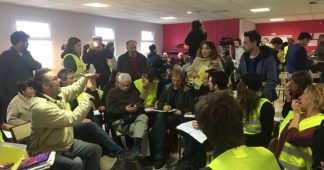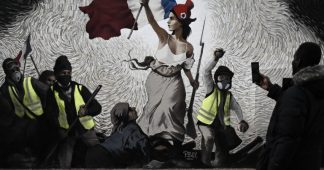Α Revolt struggling to give birth to a Revolution
By Dimitis Konstantakopoulos
March 20, 2019
3rd of three articles (first and second).
Nation, worker, left and right… all of these ideas, of course, are just the musings and falterings of intellectuals of and political analysts. Regular people, who form the backbone of the movement, that is, the People themselves, do not attach great importance to any of it. They only want to succeed. Besides, history teaches us that the main characteristic of a revolutionary “rise” is that it is, in actual fact, the awakening masses pushing their “leaders” forward, rather than the other way around.
“It’s all or nothing,” says Mark, the young leader of a local railway trade union, who seems close to the Trotskyite NPA (ex-LCR). One of the NPA’s tendencies, the group “Revolution Permanente,” is holding a meeting in Paris, together with the “Committee of the Wounded” and the “Women’s Yellow Vests Assembly”.
“Revolution Permanente” seems to be obsessed somehow by their focus on the expected role of the working class, of the “proletariat”. Their books describe this role, but they have not predicted that Renault, a French car manufacturer which used to employ some 42,000 people, now employs ten times fewer, not to mention that production itself has become decentralized, much of it outside of France.
Nonetheless, these facts notwithstanding, this obsession continues. “Revolution Permanente” seems to represent one of the friendliest currents of the “radical left” to the current protests. They don’t feel the repulsion many segments of the French “revolutionary left” feel for national symbols… they accept them, even if they are not fully sure why the People feel the need to use them.
The grass-root classes, including the working class, do not need class symbols when they are already expressing the will of the Nation. The Yellow vests protesters have no reason to rally behind “class” symbols when an overwhelming majority of French society already supports their demands; why side with the “part” when they have already represent the “whole”?
But there is also a deeper reason. What has been happening in France over the last three months is not just a battle among various social forces about the direction that their nation-state should take. The question here – that is, in this specific historical and spatial juncture – is whether World Finance will completely abduct what remains of the French nation-state!
The French bourgeoisie may not have surrendered France to a foreign country as it did in 1871 causing the Paris Commune, or as it did again in 1940 with Petain’s Vichy… yet, it has unconditionally surrendered the country to an alien force: global Financial Capital and its Empire. A representative of this Empire, a Rothschild banker, was essentially “appointed” to run France in the same way he might be appointed to run another subsidiary of a Bank.
By “appointing” a banker as President, they completed the transformation of the State into such a subsidiary.
And by pretending they are Gods, they provoked the Revolution.
This is something that is much better understood, rather, “felt,” by the people than by their aspiring leaders. As we have already noted, this is why protesters wave the tricolor flag of the Republic and sing their national anthem.
Napoleon also knew the subversive, revolutionary potential of the Marseillaise, which is why he banned it upon becoming an Emperor; just as Marshal Petain did much later as head of the Third Reich-collaborationist Vichy regime. It is also striking that there was just one flaw in Marcon ’s otherwise impeccable and impressive inauguration ceremony. After his election in 2017, looking visibly embarrassed, he did not sing along to the national anthem as everyone else around him did.
Symbols are important, not just in and of themselves, but as a means of organizing the thoughts and emotions of millions of people.
Crossing the Rubicon
Inside the conference room, near the metro station Voltaire, where the “Permanent Revolution” group is holding their meeting with the “Committee of the Wounded” and the “Women’s Assembly”, it is freezing cold and seats are scarce. But this does not deter hundreds of people from attending and staying until the end, listening to the discussion with dedication despite having to stand for hours in the packed room.
The representative of the “Women’s Assembly” describes the problems of working women in France. People have started talking in France and they are not about to stop. They talk in meetings, assemblies, on Facebook, expressing themselves at any chance they get – but never through the media, which, now more than any time in the past, seems to exist in an almost virtual world of its own. Their unbearable social suffering, the every-day problems of the lower social classes, of the abandoned, despised, unappreciated, isolated half of the society of France, a country which, up until the emergence of the yellow vest movement, was envied for its prosperity, social progress and freedom – or at least, that’s how it had been marketed.
For a long time, and even today, western media sources do the best they can to conceal the degree of social regression which has been characterizing Europe over the last several decades, especially the last 10 years, since the financial crisis of 2008. They are trying to preserve – with the help of their obedient Media and deceptive “European statistics” (such as considering someone who works 10 hours a month to be employed) – the increasingly fake, or at least very partial, image of a prosperous and affluent Europe, which, assuming it existed, is relevant for only a diminishing portion of the continent’s population.
But if European reality was as depicted by the media, it would have been impossible to explain both the yellow vest movement and the voting patterns of European citizens in all elections and referendums.
Now it’s 20-year old Frank’s turn to take to the microphone. There is complete silence in the room, as he describes in simple words and a broken voice, how he got blinded in one eye by a tear gas grenade, that he doesn’t know if he will ever be able to work again, and that he has already lost half his weight. He talks about the 20 surgeries that he has been subjected to as doctors were trying to save his eye before he was finally told that they will stop trying as he won’t be able to survive any further surgeries.
The audience listens, their eyes filling with tears, as the young man closes his speech by saying “What I have suffered makes me what I am” (Ce que j’ai subi fait de moi ce que je suis).
I can’t help but wonder if those who decided to launch this type of crackdown are able to understand its consequences, and thus deliberately cause them, or they are just losing their cool.
It is obvious that the “seeds”, which have already been planted will sooner or later grow and that, regardless of how the current ongoing crisis will unfold, these are the type of seeds which can create a social psychological abyss in a country and lead, no one knows when or how, to deadlocks that can only be solved by revolutions, civil wars or dictatorships. Indeed, we still haven’t met anyone across the political spectrum here in France, from the far left to the far right, who does not recognize that such risks exist.
Even if by some magic the Yellow Vests were to disappear tomorrow, it would be impossible to erase their mark completely. When the Interior Minister Castaner visits a primary school to discuss with the children, a small pupil asks him:
“Do you think the Yellow Vests have already entered into History?”
But, if the Yellow Vests enter into History for good, there will not be much place left for Castaner, Macron and their friends.
In Place de la Republique, a middle-aged protester expresses his anger about the President and the government by shouting: “Kings have been killed for much less than the things you do” and the crowd erupts: “Macron resign!” (Macron Demission!)
Read more at https://uwidata.com/2783-the-yellow-vests-a-leftist-movement-which-does-not-want-to-be-called-leftist/










